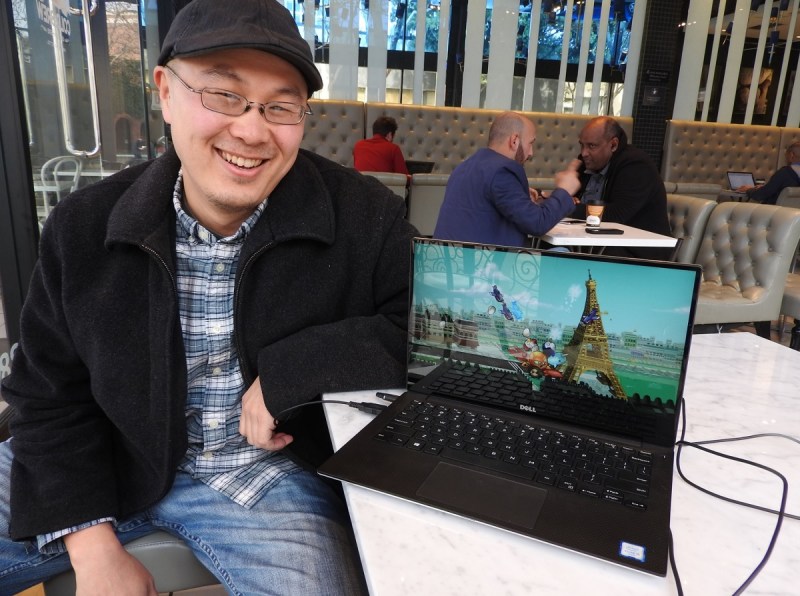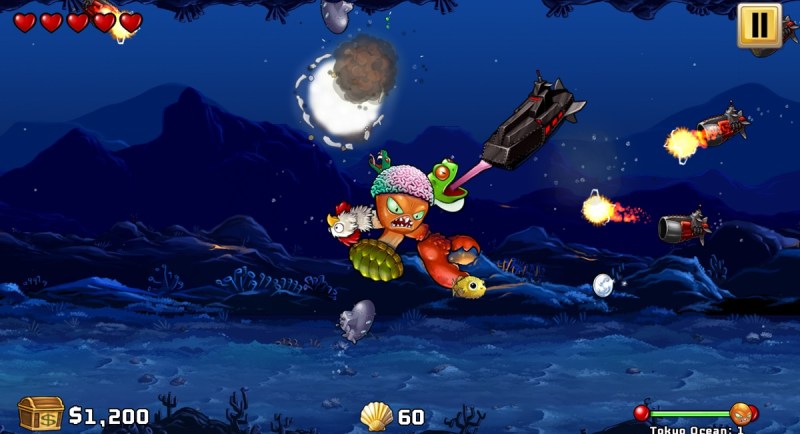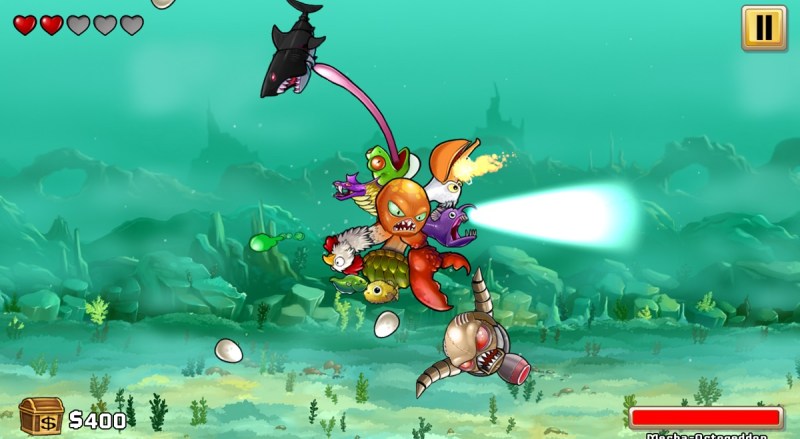George Fan, the co-creator of the phenomenal 2009 hit Plants vs Zombies, is back with a crazy and fun new game called Octogeddon from his new indie studio, All Yes Good. I’ve played it, and I suspect it’s going to be a big deal.
Octogeddon is an arcade-style action game where a giant octopus becomes angry and destroys the world. The 2D side-movement game debuts on the PC gaming platform Steam on Thursday. The octopus is simple to control, as you rotate it left or right using just two keys on your keyboard. Over time, you add weapons and more arms to the octopus, so that it becomes a wheel of extreme firepower. But the enemies come at the octopus from all directions, hoping to stop it from destroying landmarks like the Statue of Liberty.
This game has hit potential. Plants vs Zombies played a role in Electronic Arts deciding to buy PopCap Games for $650 million in 2011. The sequel, released in 2013, has been downloaded well over 25 million times.
Fan got the idea for the game during a game jam, Ludum Dare, in 2012. One person was supposed to design an entire game, from the gameplay to the art, in 48 hours. He came up with the idea, but then spent the next four-plus years polishing it with a team of four people. I interviewed him about it, and then played the game. I’ll have a full review for it tomorrow.
Here’s an edited transcript of our interview.

Above: George Fan is the cofounder of All Yes Good and designer of Octogeddon.
GamesBeat: Tell me about how your progress.
George Fan: When you last played it, the game was more like—I call it campaign mode, where you go level by level. It’s like Plants vs. Zombies. There’s a level structure, and once you pass those levels you beat the game. I was toying around with something that I thought might be more interesting for this game. It takes some inspiration from roguelike games, where there’s a set amount of levels, and you’re not really expected to pass them all the first time.
One way our game is very different from most other roguelikes—they’re notorious for being extremely difficult. Our game is not. Just because it’s a twitch game, there’s going to be some level of—it’s not going to have as wide an appeal as Plants vs. Zombies, which was mostly strategy. This game has a good deal of action. There are limits there. For an action game to be interesting to all kinds of people, that’s very hard to do. In any case, we were toying around with some roguelike structure, some random elements. Every time you play, it feels different enough, hopefully. It might take you three to eight tries to beat the game. Every time you play you’re getting stronger and stronger.
The ups and downs came from—we tested that on some younger kids playtesting the game. The nice thing about the campaign structure, once you pass a level you’ll always start from that level. You’re not set all the way back. I thought, “Maybe this is wrong. Maybe we should go back to the campaign structure and save the roguelike elements for after you beat the game.” Even though I felt like that was the more interesting mode. Maybe you could have adventure mode, the first mode, and then do roguelike after that, and you’d get the best of both worlds, kind of.
That was a dip. We had a huge upheaval in the whole game. It took a long time to convince my programmer to go back to the adventure mode after we’d just made the switch. And then, a few months later, I really thought—hiding the more interesting mode at the end, if we could avoid that, I really wanted to avoid that. I had to convince my programmer, again. That was a tough conversation. “This is for the best.” I wrote this whole thing out in preparation.
And so now we’re back to the roguelike structure, which I think is the right call. I’m 99 percent sure this time. It fits with the Steam audience a lot better. It’s much more interesting in this day and age, when replayability is so important. If people were going to stream this game they’d stream the roguelike mode instead of the campaign mode, because it’s a lot more interesting to watch.
GamesBeat: By roguelike, you mean that if you get killed, you start over?
Fan: You do have a certain amount of lives, but yeah, if you lose all your lives you start over. What’s different here from a lot of roguelikes is there’s a persistence to it. There’s a meta-campaign, where every time you end a run, it takes you to this shopkeeper. He’s the new Crazy Dave. At that point you can buy permanent upgrades that last between games. The cool part about that is, every time you start over you’ll have cool new things to try. You’ll naturally be stronger than you were the last time. You’ll get further in the game.
GamesBeat: How many people did you wind up working with altogether?
Fan: The core team is—you have me, as the designer. We had an artist, Rich Werner, the same guy who did the art for Plants vs. Zombies. We had Kurt Pfeifer, our programmer. He did the Xbox adaptation of Plants vs. Zombies. We’re working with a musician as well. Not a whole lot of people. We have a lot of beta testers. We’ve been working on it for about four years. Obviously we’d like to have gotten it done sooner. We had those upheavals we were talking about. We’ve had hiccups through the process.
I can send you a chart I drew in MS Paint, a chart of, over time, how good I felt about each game. I drew a chart for Plants vs. Zombies. With Plants vs. Zombies, the first prototype started out pretty low. It wasn’t very much fun. You were spending too much time nurturing your plants. I took all that nurturing part out, so you didn’t have to micromanage anything anymore. But it constantly went higher and higher. There were small dips. When we had to figure out the name of the game, that was a dip. But overall it was really smooth. The game design process was smoother, and we had that shield of being within Popcap. That took care of a lot of stuff for us.
This is our first time really being indie. With Octogeddon, that first prototype was much higher than Plants vs. Zombies, because it was fun right off the bat, right at the game jam. But then it dipped further and further below. “How do we make this into a full game?” It made these huge rises and falls, with each of those upheavals. We had a lot of challenging things happen. But at the very end it shoots up. At the time I made the chart there were three weeks left. It exponentially rises to meet Plants vs. Zombies and possibly even pass it. But I’ll leave that up to you. I just feel like the game did get a ton better in the final month or so.
GamesBeat: Do you feel like going indie was the only way to do this? Or a better way to do this?
Fan: Hmm. There’s good and bad about being indie. I’m going to try my hardest to be indie from now on, just because I want to be able to not have any outside pressure. I want to make the games I want to make. I’d rather not have anyone dictating anything – this is the game you have to make, this is the business model, anything like that. For that reason, indie is the only way to go for me. But there are definitely challenges that go with it.
GamesBeat: Did you have enough money to keep going for such a long development? Was there any pressure on that end?
Fan: No, it wasn’t any huge pressure, but at the same time—I can’t just keep making this forever, right? But it’s definitely not anything like, if I don’t release the game I can’t eat.

Above: Octogeddon features an angry octopus with as many as eight weapons.
GamesBeat: What’s the plan for afterward? Do you plan to support this in the future?
Fan: The other reason this game isn’t like Plants vs. Zombies—I feel like with Plants vs. Zombies, for the whole last year, we could have launched the game at any point. It was ready to launch two and a half years in, and we launched at three and a half. That whole last year was just polishing like crazy. This game is more like—it’s taken too long already. Let’s set a release date and sprint toward it. We can’t change that now, but there is a lot more I would like to get into the game.
For sanity’s sake, I have this bulleted list of all these things I want to get in. I just move them to a section that says, “First DLC patch,” something like that. Which is going to be free. But extra modes, extra cool power-ups you can get, we’re definitely thinking—we’re going to move that until after launch. Nothing is set in stone. It’s just a bunch of ideas that I’ve moved to this section that I think I’d like to do.
GamesBeat: What do you think you’ve learned from this compared to what you learned from Plants vs. Zombies?
Fan: This was interesting, because one, it was made in the shadow of Plants vs. Zombies. As much as I told myself—I knew it would be a pitfall to say, “This game has to be as good as Plants vs. Zombies.” I’m pretty sure I’m never going to make—I’ll never say for sure. But I’ll be happy if I never make a game as good as Plants vs. Zombies, because I feel like I already did something really awesome with that.
It’s not beneficial to think in those terms, like I’m trying to challenge that. I’m trying my best to just think of this as its own thing, trying to make it the best it can be. But I can’t push the whole Plants vs. Zombies thing out of my mind completely, as much as I tell myself. That’s a challenge, making something right after you make something very successful. Every game before Plants vs. Zombies, I was just making a game. Now, after making Plants vs. Zombies, I’m making a game in that shadow.
GamesBeat: Do you have to argue with yourself about that kind of perfectionism?
Fan: Well, I’m not a perfectionist, but I do like to polish games a lot. The cutoff for getting new content in the game was supposed to be two weeks ago, but it was really today. At this point I’m just telling myself—I made that list of things I want to get in for the first patch. It’s always a challenge. You could be adding features forever.
Here’s something funny. When we all sat down to make this game, after I’d done the game jam version, we said, “This is going to be a fun year-long project. We’ll spend a year making this. It’ll be great. Obviously it’s not as big in scope as Plants vs. Zombies, so it shouldn’t take that long, right?” We were pretty wrong about that. It ended up taking longer than Plants vs. Zombies by a bit.
GamesBeat: It seems like you had to do not just a lot of polishing, but also retracing your steps, going back to try something new. That’s a more painful process.
Fan: That’s why, if you see the chart, it’s going up and down. [laughs] It was for the best, I think. But it’s hard to know for sure. You played the version from last year where it was just a campaign. I remember you liked it. I came here thinking, “Well, maybe he won’t like this as much.” But in the big picture I think this is the right decision. You can tell I’m not a marketer.
That’s what game design is a lot of the time. It’s a lot of taking aim and shooting in the general direction. You can test it out afterward, but a lot of the time you just don’t know for sure. You make your best guess. You rely on everything you’ve read and heard and played, but you also rely on your gut intuition, all this unconscious—I just think this is the right call. But there was a lot of uncertainty in this project, more so than in Plants vs. Zombies.
GamesBeat: Little touches like the people falling out of the buildings, that’s an improvement.
Fan: I’m glad I fought for that. I did have to fight for it, because we’re trying to lock things down. I joked that I think people falling out of buildings is going to raise our Metacritic score by a whole point. I really think it could. I wasn’t sure it was going to happen, but I saw it in there yesterday and I was overjoyed.

Above: In Octogeddon, you have to fight off enemies from all directions.
GamesBeat: Was deciding on a release date what you motivated you to finish it?
Fan: People on the team were going crazy. I told them, “Early next year,” and this was in 2016. All of late 2015 we were saying, “Let’s converge on releasing this game.” Since you last saw it, though, it’s changed to—oh, man, was that after—I can’t remember. There were two switches to campaign mode and two switches to roguelike. I can’t remember whether you played it before all that process or in the middle. But that made the game take longer to come out.
We also just underestimated how big it was going to end up being. Every game has a size that is ideal for it. You want to build it to that size. We underestimated what that would be for the kind of game this was. Initially we thought it would be a much smaller game.
GamesBeat: It should get a lot of attention. It got a lot of attention a year ago.
Fan: Yeah, we got a good amount of buzz last year. There are a ton of games coming out, so I don’t know what to expect. I feel like I’ve been getting more vibes of people seeing—I posted just little clips of the trailer, without divulging the full trailer yet, and people seemed pretty excited.

